Officials are often seen as the villains or enemies of whichever sport they oversee.
Volleyball is no different especially when it comes to the 1st & 2nd referee’s and often the line judges.
This article however is going to look at just how vital officials are to the sport of volleyball and how without them the game would be a complete farce.
Officials play multiple roles in volleyball, they are the overseers of the game, the peace keepers in tense situations and the deciders in close calls.
Officials are the unsung heroes of all sports but this is especially true in Volleyball.
Volleyball consists of multiple officials and each one has a different role or responsibility.
In summary, the volleyball officials and their roles are as follows:
-
- 1st Referee who is responsible for making the final decision.
- 2nd Referee who assists the 1st referee to ensure the game is played without faults.
- Line Judges who are responsible for signalling whether a ball has landed in or out of bounds.
- Scorekeepers who are responsible for keeping score and ensuring the game is played in the correct order.
- Assistant Scorekeeper who helps the scorer keep on top of other factors related to scoring such as monitoring substitutions, monitoring service order and recording sanctions. The assistant scorer also keeps track of Libero rotations.
The roles of each official are actually quite involved and if one official lapses it could have a drastic effect on the decision, score and overall result of the match.
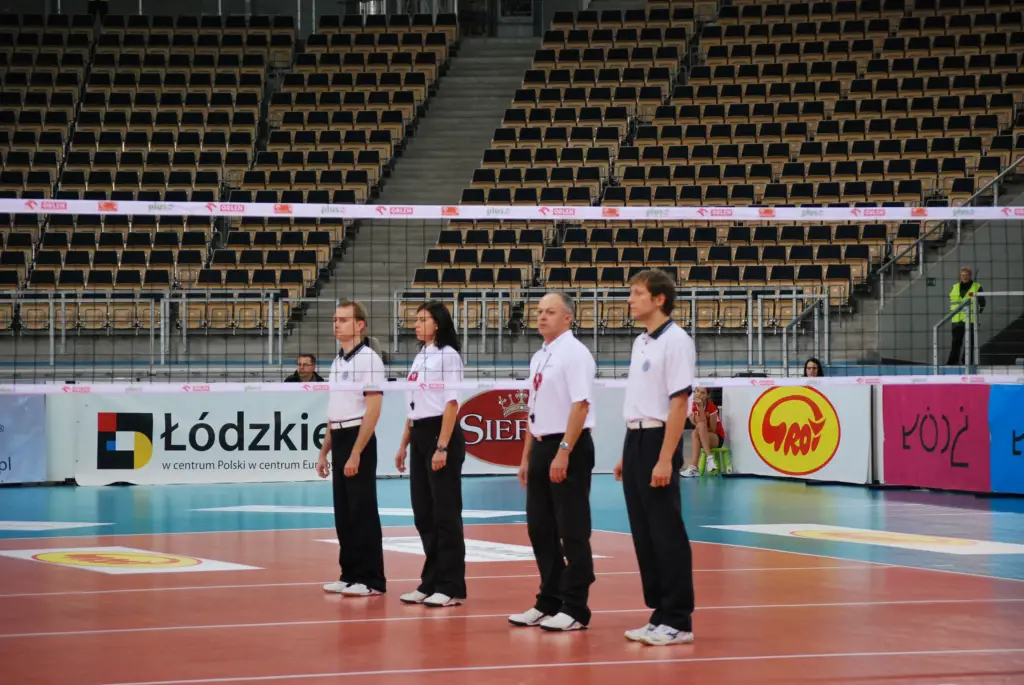
I touched on what each official’s role is above however this is just the tip of the iceberg so let’s take a better look at what each role involves.
Want to get started with Volleyball?
Head over to Amazon by clicking here to get your volleyball essentials
Table of Contents
1st Referee
The 1st referee is the official that you will often see standing at the top of the podium on the opposite side of the court to the scorers and 2nd referee.
This allows them to see all other officials to make decisions easier and quicker to ensure the game runs as efficiently as possible.
Ultimately the 1st referee is responsible for making every decision that takes place and if they see fit they can overall or alter any call.
In general the 1st referee will be responsible for starting each rally and signalling the serving team to serve, watching for obvious faults during live play which include but are not limited to: double contact, carry, 4 hits, net touches, back court violations & Hand overs.
There are many other faults which the 1st referee is required to look at for however this is where the help of the 2nd referee comes into play.
Just from the faults noted above you can see the 1st referee has a lot on their plate, not to mention the fact they are ultimately responsible for all the other members of the officiating crew.
The 1st referee will often discuss with the 2nd referee before the start of the match which faults they would like the 2nd referee to watch out for.
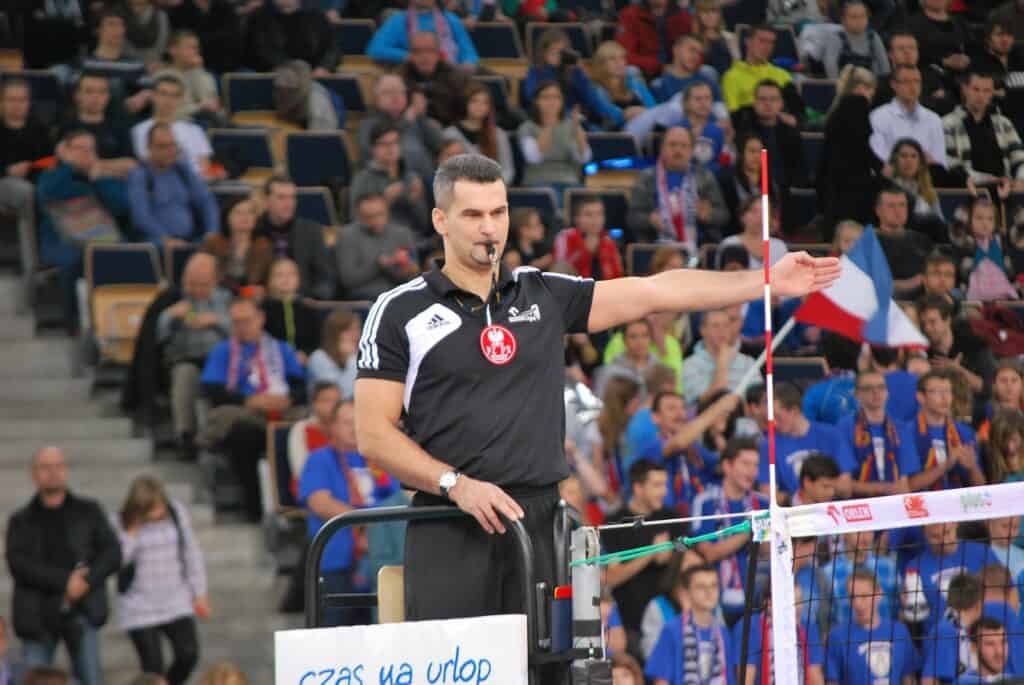
What To Expect as a 1st Referee
If you have the pleasure of being a 1st referee at your next game it might be nice to know what you should expect throughout the event of the match.
Before the match starts the 1st referee must gather in all other officials to run over the course of the match and what each official is expected to do, look out for or record as applicable.
This also gives the other officials a chance to ask any questions or clarify anything they may be unclear on surrounding their duties.
Once all the officials have been briefed the 1st referee will ask for the captains from each team to come over to the referee stand.
The 1st referee will meet and shake hands of both captains and ask the captains to greet each other.
The 1st referee will then explain how the match will proceed and what to do in certain situations such as to question a call or raise any issues during the match. Once this is all agreed the 1st referee will initiate the coin toss or similar to determine which team will be serving and receiving.
This information will be reported back to the scorers to allow them to note down which team is which side and who is serving first.
Once the formalities and warmups are completed the 1st referee will ask the starting teams to take the floor, once all players and officials are in position the game can begin.
The game will commence and throughout the match the 1st referee will be responsible for deciding which team is awarded the point and keeping an eye out for any faults during live play.
Once one of the teams has reached the required score to win the set the referee will finish the set, ask the teams to switch sides before recommencing for the following sets.
The last role the 1st referee has is calling a close to the match once one team is announced victorious.
2nd Referee
As noted above the 2nd referee’s main purpose is to assist the 1st referee in ensuring the game runs as fairly and efficiently as possible.
The 2nd referee does however get involved in things that the 1st referee doesn’t.
The 2nd referee must take the lineup sheet of each team before the start of each set and ensure they are lined up correctly.
This is one role that must be repeated before each rally, if a team is not in the correct lineup the second referee will blow the whistle to signify a fault has occurred.
The 2nd referee will also action substitutions and oversee the scoresheet to ensure everything is running smoothly.
Aside from the roles noted above the main role the 2nd referee has is assisting the 1st referee.
As noted above the 1st referee will often ask the 2nd referee to monitor certain faults during live play. The common faults the 2nd referee will look out for are as follows: net touches, back court violations and rotation errors.
What To Expect as a 2nd Referee
Being a 2nd referee whilst still holding many responsibilities is certainly less involved than being the 1st referee.
Before the match the main role of the 2nd referee is to collect the lineup sheets from each team and liaise with the scorers to ensure the relevant pre-match information is recorded correctly.
During the match the 2nd referee will look out for rotation errors/ alignment errors as well as net touches and back court violations.
At the end of each set the 2nd referee should review the scoresheet to ensure all information has been noted and recorded correctly before proceeding to the next set.
Come the end of the match the 2nd referee should again review the scoresheet.
Line Judges
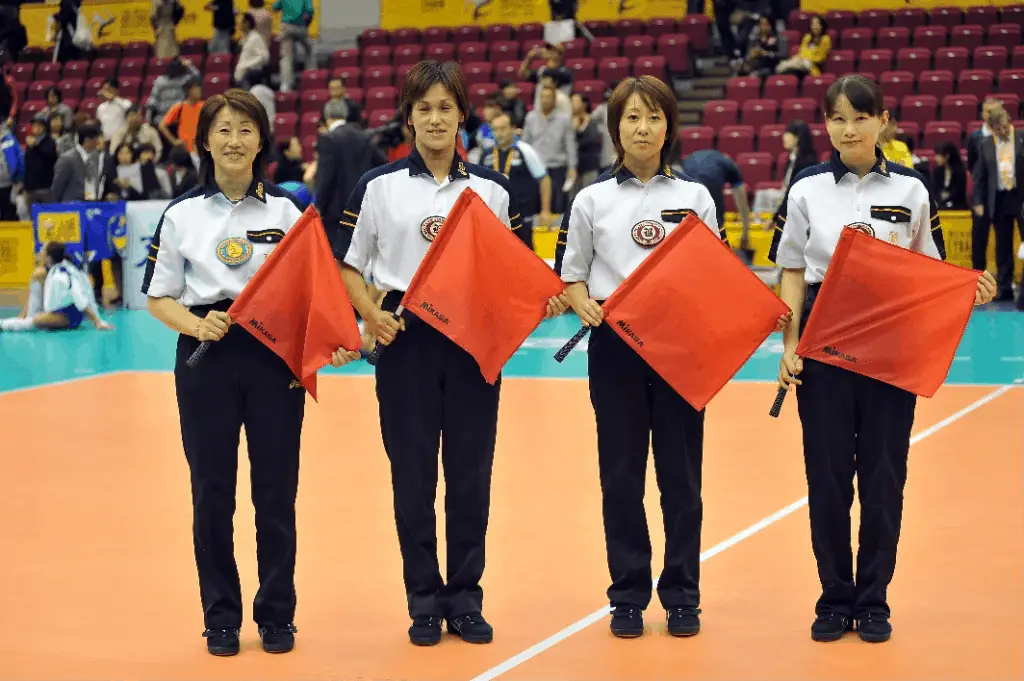
Depending on the level you may have more or less line judges.
In lower levels of volleyball it is quite common to only have 2 line judges, the 2 line judges will stand in opposite corners from each other and each one will watch one baseline and the nearest sideline.
In higher levels of competition there are traditionally 4 line judges.
The 4 line judges will each stand in one corner of the court and lines will be divided up between them, two of the line judges will watch a sideline each whilst the 2 remaining line judges will watch a base line each.
The main role of the line judge is to signal whether the ball landed inside or outside the line they are in charge of watching.
The line judge will use a flag to indicate to the 1st referee whether the ball landed in the court or out of the court.
There are 5 main signals that a line judge will use to indicate faults to the 1st referee, these signals are as follows:
Ball in

Ball is out

Ball touched Antenna
Ball out after touching player

Service Line Foot Fault
Aside from the above noted roles the Line judges don’t have any other roles or responsibilities
Scorekeepers
Score keeping in volleyball is actually a very demanding and complicated job. There are lots of different responsibilities that the score keeper has to tackle and each of them entails recording or noting a different number or statistic.
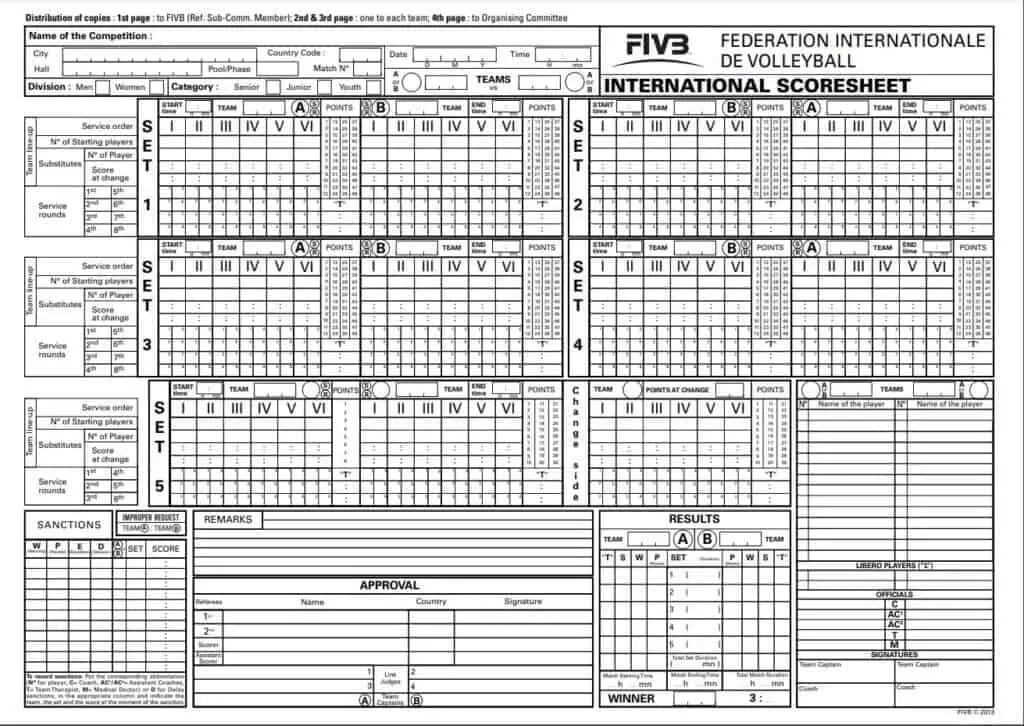
Fortunately each of these things is recorded at different times throughout the event, in fact a score keepers role can be split into 3 different sections.
Things that must be noted before the match
Stats that are recorded throughout the match
Compiling of results after the match.
If you want to know in depth exactly what to record and how to fill out a score sheet from start to finish I have put together a full guide which you can view by clicking here.
In short though these are the items that would be recorded at each phase.
Before the match
Before the match commences the scorer must note the following information down
- Competition
- City & Country Code
- Hall (Venue)
- Pool/ Phase
- Match No.
- Division
- Category: Senior, junior, Youth
- Date
- Starting Time
- Teams
- Number & Name of Players
- Officials
- Starting Line-up
- Service order
During The Match
During the match the scorer must record the following information
- Start Time (of the set)
- Service Rounds
- Points
- Substitutions
- Time-outs
- End Time (of the set)
- Sanctions
After the Match
After the match the scorer must compile the results as well as the following information
- Teams
- Time-Outs
- Sanctions
- Winner of set
- Points
- Duration of sets
- Event Start Time
- Event End Time
- Winner of Match
- Final Score (in sets)
Now as I said there is a lot to take in and note when being a scorer for a volleyball match, if you want to learn more click here.
Assistant Scorekeeper
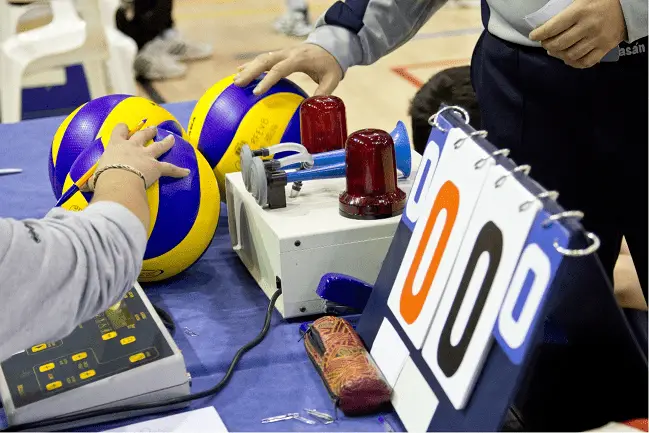
After reading the above I’m sure you can see why a scorer must need someone to assist them as it can be a tall order to keep on top of everything that happens when the game is underway.
Unfortunately although the scorekeeper probably needs the most help the assistant scorer actually has quite an important job of their own to do.
As a Libero abides by different substitution rules the assistant scorer is often tasked with monitoring the Libero’s movements, for this reason the assistant scorer is sometimes referred to as the ‘Libero Tracker’.
Apart from the above roles the assistant scorer is often in charge of using the manual or electronic scoreboard and then regularly comparing this to the scoresheet to ensure no inconsistencies are present.
Officials Appreciation Summary
That just about sums up the roles and responsibilities of the officials in volleyball, but hopefully now you know everything they are expected to do it will offer a new sense of appreciation for just how hard they have to work to ensure the match runs smoothly and the event is played fairly from the moment you arrive right to the final point of the game.
Volleyball is a sport which requires all officials to work in great unison and if one official zigs while the others zag it can quickly lead to issues.
